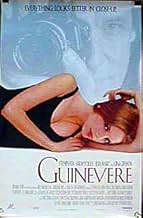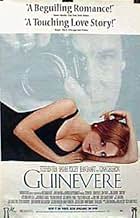IMDb रेटिंग
5.9/10
2.8 हज़ार
आपकी रेटिंग
अपनी भाषा में प्लॉट जोड़ेंA young girl from an affluent family rebels and becomes involved with a much older photographer.A young girl from an affluent family rebels and becomes involved with a much older photographer.A young girl from an affluent family rebels and becomes involved with a much older photographer.
- पुरस्कार
- 2 जीत और कुल 7 नामांकन
Sharon McNight
- Leslie
- (as Sharon Mcnight)
फ़ीचर्ड समीक्षाएं
Writer/director Audrey Wells, who would go on to make 2003's "Under the Tuscan Sun" as well as the recent "Shall We Dance", directed Sarah Polley in 1999's "Guinevere". Wells' forte seems to be characters in search of romance who find it in unexpected places. It was the 'ugly' girl in "Truth About Cats & Dogs", Italy in "Tuscan Sun", and the older man in this film. That older man is played with wild abandon by Stephen Rea, often inappropriately stealing the show. Ignoring Jean Smart's histrionic heavy scene later in the film, and the control Rea's Connie has over Polley's Harper, this is Sarah Polley's film. What make this film work is its sensitivity and subtly, especially toward Harper's youth, naivete, and uncertainty in love and life. It's a sweet film about self-discovery at any age, and although it gets a bit moody toward the end, it works well as a date movie.
The young Canadian actress Sarah Polley can sizzle in character parts--she burns a hole in the screen in her tiny bit in Cronenberg's EXISTENZ, and she was luminous as the princess in the wheelchair in THE SWEET HEREAFTER. But in leading roles, she seems both brittle and amoeboid. As Harper, the insecure and overlooked daughter of a family of cutthroat lawyers, she has one amazing scene--being seduced, her reactions fry out her speakers, sending from giggly hysteria to overdrive lust. Harper is seduced by an aging bohemian wedding photographer (Stephen Rea)--a lush who talks a big game, pontificates in bars with his low-rent cronies, and makes a sport and a pastime of mentoring (and groping) avid young women. But we don't see any hunger, any passion or obsession in Harper. When the photographer, Connie, tells her she has talent it's an obvious pick-up line--not because she hasn't done any work, but because she shows no interest in anything but being noticed.
The writer-director, Audrey Wells, doesn't show much interest in anything else, either. The author of the scripts for GEORGE OF THE JUNGLE and INSPECTOR GADGET, her first indie feature has more than a whiff of the dilettante. Like AMERICAN BEAUTY, GUINEVERE likes to flirt with the idea of having an "edge," then shies away from it. Both of these movies are just too damned clear. The pleasure of that seduction scene is that Harper responds in ways that are messy, funny, unprogrammed; every other scene in the picture makes its point in letters so bold the thickest member of the audience couldn't miss it.
You can take the girl out of the studio, but ain't no way you're taking the studio out of the girl. The lechy photographer's big sin--the thing that makes him evanesce in Harper's eyes--is that, at fifty, he's still stumping and hustling for cash. Can Audrey Wells really intend that it's okay for Connie to be a serial phony, an ego-inflating come-on artist, but his real Achilles' heel is that he never made real money? (Wells' point seems to be: Connie gets Harper's tender young flesh--he could at least pay the bills.) Every scene is so blandly overdetermined it reeks of falsity--especially the much-applauded one where Harper's bitchy mom (Jean Smart) comes into Connie's loft and undoes their relationship with a single cutting observation. (Would these lovers react with such shock to such an obvious accusation?)
For someone making a movie about the romance of the artist's life, Wells seems to have no clue how artists talk to each other, or even behave--she seems to think that's egghead stuff the audience won't care about. But it's that, not sex, that's supposed to be the fundament of Connie and Harper's relationship. Despite Rea's and Polley's efforts, the movie drowns in big-movie timidity. And the ending--a Felliniesque princess fantasy where all of Connie's sweet young things gather for an All That Jazz adieu--maybe intended to be tender. It comes across as a final, passive-aggressive flipping of the bird to a half-forgotten, dirty-minded teacher.
The writer-director, Audrey Wells, doesn't show much interest in anything else, either. The author of the scripts for GEORGE OF THE JUNGLE and INSPECTOR GADGET, her first indie feature has more than a whiff of the dilettante. Like AMERICAN BEAUTY, GUINEVERE likes to flirt with the idea of having an "edge," then shies away from it. Both of these movies are just too damned clear. The pleasure of that seduction scene is that Harper responds in ways that are messy, funny, unprogrammed; every other scene in the picture makes its point in letters so bold the thickest member of the audience couldn't miss it.
You can take the girl out of the studio, but ain't no way you're taking the studio out of the girl. The lechy photographer's big sin--the thing that makes him evanesce in Harper's eyes--is that, at fifty, he's still stumping and hustling for cash. Can Audrey Wells really intend that it's okay for Connie to be a serial phony, an ego-inflating come-on artist, but his real Achilles' heel is that he never made real money? (Wells' point seems to be: Connie gets Harper's tender young flesh--he could at least pay the bills.) Every scene is so blandly overdetermined it reeks of falsity--especially the much-applauded one where Harper's bitchy mom (Jean Smart) comes into Connie's loft and undoes their relationship with a single cutting observation. (Would these lovers react with such shock to such an obvious accusation?)
For someone making a movie about the romance of the artist's life, Wells seems to have no clue how artists talk to each other, or even behave--she seems to think that's egghead stuff the audience won't care about. But it's that, not sex, that's supposed to be the fundament of Connie and Harper's relationship. Despite Rea's and Polley's efforts, the movie drowns in big-movie timidity. And the ending--a Felliniesque princess fantasy where all of Connie's sweet young things gather for an All That Jazz adieu--maybe intended to be tender. It comes across as a final, passive-aggressive flipping of the bird to a half-forgotten, dirty-minded teacher.
Thoughtfully written, well acted, provocatively true to life... this is a movie for the intelligent, mature audience, not a movie to appeal to the lowest common denominator. Those who are too lazy to think (or just unable to!) won't "get it" and will condemn it because it did not hand them an answer on a platter. Those who thought about the story rather than merely reacting and who dug into the emotions found level after level of story and enjoyed the irony of the fact that even the most intelligent among us frequently do something we may later view as stupid. Even so, those "stupid" things help shape who we are, and may be as important to the formation of who we are as the "correct" choices we also make.
Worth the ticket and worth buying it on DVD when available.
Worth the ticket and worth buying it on DVD when available.
This is a murky, unfocused little film. It is clear that Audrey Wells is a talented writer-director, but I felt a lack of assurance in the execution of her story. However, Jean Smart delivers a brilliant performance that enriches the film, making it memorable. She nails every single SECOND of the film she's in; her monologue towards Rea is a devastating piece of acting that was shamefully overlooked by the Academy. This woman is one of the best actresses of her generation, and if you saw her hilarious, Emmy-winning spot on "Frasier" you know she's got strong comedic chops, too. Give Jean Smart better roles!
This was a slow moving but interesting story about a 50 something bohemian photographer named Connie Fitzpatrick (Stephen Rea) who is a serial seducer of impressionable young women. His seduction is not really about sex, although that is part of it. Instead, it is more of an emotional seduction that involves his creating a symbiotic mentor/protégé relationship that puts him in control while feeding his ego. His latest conquest is Harper Sloane (Sarah Polley), a recent college grad from a wealthy family who is all set to go to Harvard Law School. Clearly lonely and vulnerable and not used to the attention of men, she falls prey to the charms of this free spirited older man and eschews law school to run off with him and live the artsy life.
Director/writer Audrey Wells, whose best previous writing credits were for "The Truth About Cats and Dogs" does an excellent job bringing this story to the screen in her directing debut. Her shooting of the scenes was sensitively done and brought forth a lot of the emotional elements of the story and the characters. It is clear that this was a labor of love for Wells, but as is often the case, directing one's own work takes away the objectivity about the script leaving most of the plot problems intact.
It is believable that an insecure girl could be lured into a relationship by a charming older man who overtly appreciates her and believes in her abilities. May/September romances (or more aptly in this case April/August) are common and usually happen for all the reasons depicted here. The biggest problem with the story was the introduction of Billie (Gina Gershon), one of Connie's earlier alumni, so early in the story. Billie warns Harper of the specific manipulative lines that Connie uses repeatedly with each of his love interests, almost by rote. She gives great detail right down to the way he touched her and the fact that he calls them all Guinevere.
At that point, Harper does exactly what one might expect, she leaves him. Shortly thereafter, the story loses all credibility as she eagerly goes running back to him, knowing full well that she is being totally and impersonally manipulated. The entire relationship after that waits for an emotional explosion that never comes. The whole thing just sort of withers away with the eventual breakup being no more than a fait accompli. The breakup scene was weak and cowardly, which detracted greatly from the dramatic potential. If Wells had put Billie's scene closer to the end of the story to create the last straw it would have been more effective.
Wells also misses a great opportunity to add fireworks by not emphasizing Harper's relationship with her mother (Jean Smart). There was a natural emotional tension between the two and she was the one character who had complete clarity about the relationship. Finally, without giving too much away, the gathering of the five Connie alumni at the end was a bit goofy and highly implausible given the gravity of the situation. However, Wells does eventually redeem herself with a good ending and some of the best imagery of the film.
Sarah Polley was well cast in this film and exuded the pure naivety of a young woman inexperienced in the ways of love. She was wonderfully awkward and vulnerable and it was very believable that she could fall prey to the ministrations of an older man. Polley has a Winona Ryder quality about her and has excellent potential as an actress. It remains to be seen if she can break out of the role of quirky teen.
Stephen Rea was hopelessly miscast in this role. He didn't have the emotional horsepower to play this character. His acting is somewhat stoic and wooden and this character needed to be charming, passionate and obsessive. The part required an actor more like Michael Caine.
The best performance of the film goes to Jean Smart as Harper's outspoken and gregarious mother. She completely steals the movie with her confrontational scene with Connie, explaining to him why he can't make it with women his own age. She is terrific in every scene she is in and the fortune cookie scene is fantastic.
Overall, I rated this film a 7/10. This film will probably be most appealing to men over 50 and women under 25. None of the flaws were fatal, but the pace was slow and the plot implausible in parts. That detracted from an otherwise engaging story and some very good technical filmmaking.
Director/writer Audrey Wells, whose best previous writing credits were for "The Truth About Cats and Dogs" does an excellent job bringing this story to the screen in her directing debut. Her shooting of the scenes was sensitively done and brought forth a lot of the emotional elements of the story and the characters. It is clear that this was a labor of love for Wells, but as is often the case, directing one's own work takes away the objectivity about the script leaving most of the plot problems intact.
It is believable that an insecure girl could be lured into a relationship by a charming older man who overtly appreciates her and believes in her abilities. May/September romances (or more aptly in this case April/August) are common and usually happen for all the reasons depicted here. The biggest problem with the story was the introduction of Billie (Gina Gershon), one of Connie's earlier alumni, so early in the story. Billie warns Harper of the specific manipulative lines that Connie uses repeatedly with each of his love interests, almost by rote. She gives great detail right down to the way he touched her and the fact that he calls them all Guinevere.
At that point, Harper does exactly what one might expect, she leaves him. Shortly thereafter, the story loses all credibility as she eagerly goes running back to him, knowing full well that she is being totally and impersonally manipulated. The entire relationship after that waits for an emotional explosion that never comes. The whole thing just sort of withers away with the eventual breakup being no more than a fait accompli. The breakup scene was weak and cowardly, which detracted greatly from the dramatic potential. If Wells had put Billie's scene closer to the end of the story to create the last straw it would have been more effective.
Wells also misses a great opportunity to add fireworks by not emphasizing Harper's relationship with her mother (Jean Smart). There was a natural emotional tension between the two and she was the one character who had complete clarity about the relationship. Finally, without giving too much away, the gathering of the five Connie alumni at the end was a bit goofy and highly implausible given the gravity of the situation. However, Wells does eventually redeem herself with a good ending and some of the best imagery of the film.
Sarah Polley was well cast in this film and exuded the pure naivety of a young woman inexperienced in the ways of love. She was wonderfully awkward and vulnerable and it was very believable that she could fall prey to the ministrations of an older man. Polley has a Winona Ryder quality about her and has excellent potential as an actress. It remains to be seen if she can break out of the role of quirky teen.
Stephen Rea was hopelessly miscast in this role. He didn't have the emotional horsepower to play this character. His acting is somewhat stoic and wooden and this character needed to be charming, passionate and obsessive. The part required an actor more like Michael Caine.
The best performance of the film goes to Jean Smart as Harper's outspoken and gregarious mother. She completely steals the movie with her confrontational scene with Connie, explaining to him why he can't make it with women his own age. She is terrific in every scene she is in and the fortune cookie scene is fantastic.
Overall, I rated this film a 7/10. This film will probably be most appealing to men over 50 and women under 25. None of the flaws were fatal, but the pace was slow and the plot implausible in parts. That detracted from an otherwise engaging story and some very good technical filmmaking.
क्या आपको पता है
- ट्रिवियाDuring the non-union shoot in San Francisco, crew members struck and were joined by star Sarah Polley, who walked the picket line. Striking crew members report that they were quite touched by her action, which was more than a gesture, but rather a sincere belief in workers' rights. On her part, Polley called her union, the Screen Actors Guild, to tell them of her action, and the union representative told her they'd back her if she crossed the picket line. SAG assumed that she was calling to ask whether she could defy the strike and cross the picket line! A shocked and dismayed Polley stayed out with the strikers, and the strike ended after three days when their grievances were met. Subsequently, Polley has stated that she has been told that she lost several job offers due to this incident as producers don't want a union 'militant' despite the film industry being a craft industry dominated by the guild (union) system and she did what she felt was right.
- गूफ़The wet spots on Harper's shirt after taking a shower. They're inconsistent.
- भाव
Harper Sloane: You're obviously mistaking me for someone with potential.
- कनेक्शनFeatured in Siskel & Ebert & the Movies: Double Jeopardy/Jakob the Liar/Mumford (1999)
- साउंडट्रैकCoquette
Music by Carmen Lombardo & Johnny Green
Lyrics by Gus Kahn
Performed by John Pizzarelli
Courtesy of The RCA Records Label of BMG Entertainment
टॉप पसंद
रेटिंग देने के लिए साइन-इन करें और वैयक्तिकृत सुझावों के लिए वॉचलिस्ट करें
- How long is Guinevere?Alexa द्वारा संचालित
विवरण
बॉक्स ऑफ़िस
- बजट
- $26,00,000(अनुमानित)
- US और कनाडा में सकल
- $6,32,283
- US और कनाडा में पहले सप्ताह में कुल कमाई
- $54,145
- 26 सित॰ 1999
- दुनिया भर में सकल
- $6,35,680
- चलने की अवधि1 घंटा 44 मिनट
- रंग
- ध्वनि मिश्रण
- पक्ष अनुपात
- 1.85 : 1
इस पेज में योगदान दें
किसी बदलाव का सुझाव दें या अनुपलब्ध कॉन्टेंट जोड़ें

































